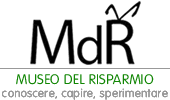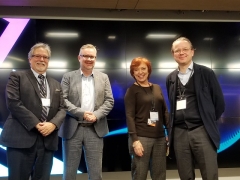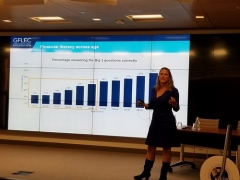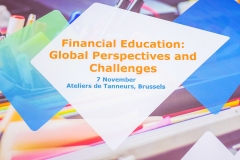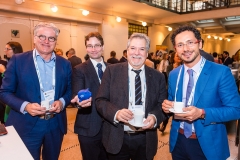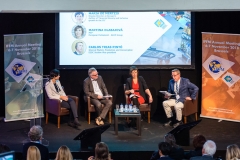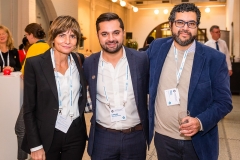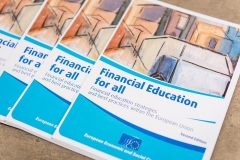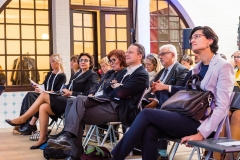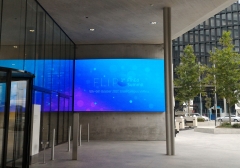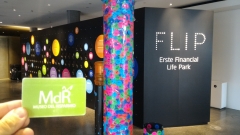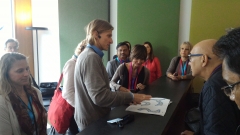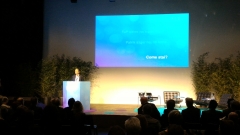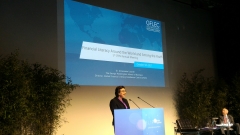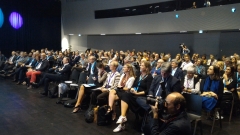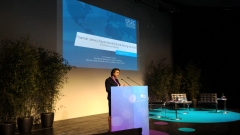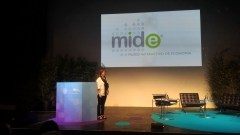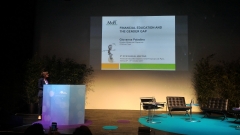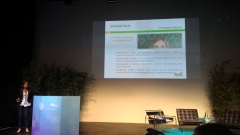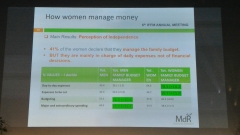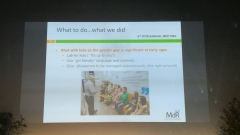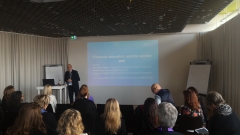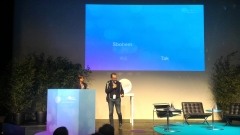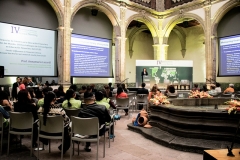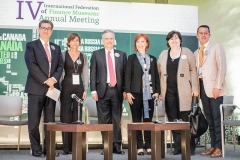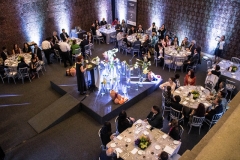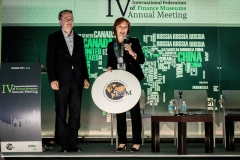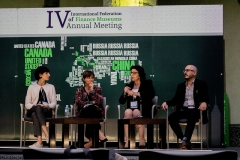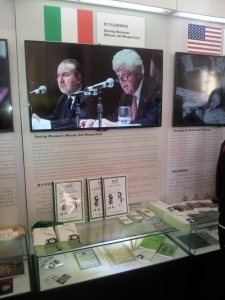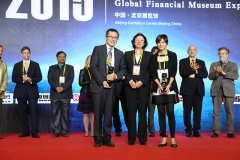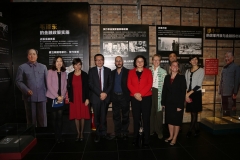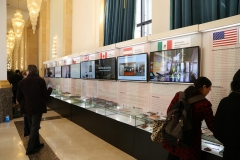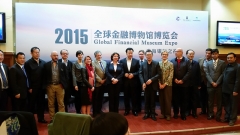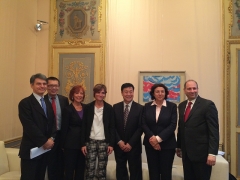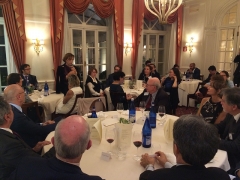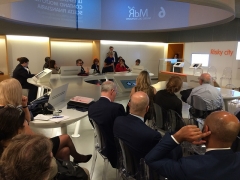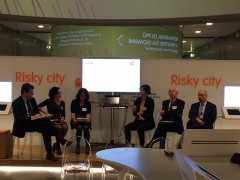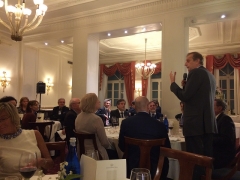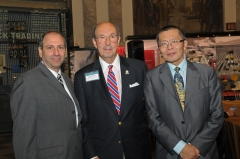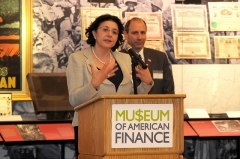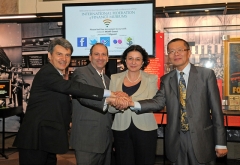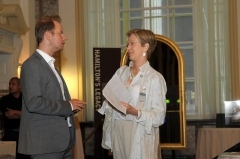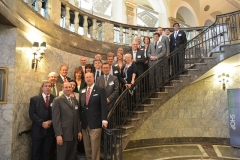The mission of the International Federation of Finance Museums (IFFM) is to provide a framework for greater collaboration among museums, facilitating the sharing of exhibits, the exchange of scholarships and scholarly resources, and the interchange of information and knowledge. The IFFM also aims to develop and implement innovative ideas and programs to advance financial literacy globally. IFFM members convene annually at an international conference that inspires innovation in the promotion of financial literacy globally, engaging media, academics, policy makers and the financial industry.
The IFFM launched in June 2013 with GFLEC serving as a founder of and adviser to the federation.
Membership Benefits:
- Leveraging best practices among the international community of finance museums
- Sharing exhibits among member museums
- Exchanging scholarship on the topics of financial history and financial literacy
- Expanding access to scholarly resources on financial history and financial literacy
- Facilitating access to affiliated archives
- Participating in annual meetings that spur innovation among finance museums globally
- Increasing exposure with a network that reaches leading media outlets worldwide
Membership Criteria:
- The prospective member organization should include promoting financial literacy in its mission
- The organization should have a physical space open to the public
- The organization should be non-profit. Member organizations may be affiliated with or supported by for-profit entities; member organizations’ activities, however, may not be for commercial purposes or for profit generation
- The organization should recognize English as the language of the IFFM
- No financial commitment is required
Founding Members
Global Financial Literacy Excellence Center (GFLEC)
Washington, D.C., USA
Chinese Museum of Finance (CMF)
Tianjin, China
Museum of American Finance (MoAF)
New York City, USA
Museum of Saving (MOS)
Turin, Italy
Virtual Open Meeting – September 21, 2023
Promotional Marketing Strategies for Museums – a focus on Finance Museums and women
After an initial round of presentations, the theme of the meeting is introduced by Riccardo Finozzi, from the Bank of Italy.
It emerged, after visiting several museums, that one of the main issues is getting visitors in. There are many different approaches to the question: some museums are focusing more on social media, some museums do not use social media but aim to integrate activities and events with the local community, some others rely on newspapers and official channels. It would be interesting to know the widespread marketing strategies and if and how they are effective, or if they are country specific.
As regards the other topic, women, some studies show that women go to museums more than men, but these studies do not consider social belonging, cultural level or type of museum visited. It would be interesting to collect data over the years to study these aspects.
The discussion focuses on the following main points:
- Words matter: there emerges a widespread difficulty in having effective marketing strategies due to the presence of the words economy, finance or saving in the name of the museum. Having the name of the museum often linked to that of a bank does not make it appealing unless a visitor has a specific interest in the theme. We should all work together to find the best way to get the public to overcome their aversion towards economic and financial issues.
- Social media: Using social media can be very complicated and the results you get are not always predictable. It would also be interesting to analyze how many followers visit the museum. Some museums ask visitors to complete an exit survey, in which one of the questions is how you found out about the museum (around 10-15% respond via social media). Communication and promotion campaigns must be created on different social networks depending on the target: Instagram and TikTok are mostly aimed at young people, the main audience of museums, while Facebook is more used by teachers and educators.
- Newsletter: the use of the newsletter is diversified as are the results recorded. Some send a newsletter every 2 weeks with all the museum’s activities to regular visitors. For them this, together with the website, is their main communication tool. For others, the newsletter is not a great success. Sending a personal email addressed directly to the beneficiary is much more effective. This way you make him feel like the center of attention and capture his interest.
- Specificity: greater results are achieved by organizing specific activities and addressing a specific target, for example, the economic training of teachers, students of specific ages, families and in particular women. Activities are also organized for female entrepreneurs or migrant women. The specific activities also allow forming partnerships with institutions, which can finance the projects and whose marketing outreach can be exploited.
Here the program of the workshop.
2022 – Rome – Bank of Italy and Museum of Saving
On the occasion of the 10th anniversary of the International Federation of Finance Museums (IFFM), the Bank of Italy and the Museum of Saving organized the international conference “Digitalization and financial awareness”, which was held in Rome on the 3rd and 4th October.
The conference was a unique opportunity for finance museums, academics, policy makers, media and the financial industry to debate on challenges to financial education and its priorities.
Among the issues covered in the Conference the impact of digitalization on learning and public engagement processes, as well as the role of digitalization on financial education and inclusion.
Download here the program of the conference.
Virtual Meeting
Due to the persistence of the Covid-19 health emergency, the 2021 IFFM annual meeting was held online on October 18 and it was combined with a workshop to explore the role of gaming and edutainment in enhancing financial education. During the event, Instituto de Estudios Financieros (Barcelona) and the GAME Science Research Center, IMT School for Advanced Studies (Lucca) provided best practices and inputs related to game-based learning.
Here the program of the workshop.
Online meeting
Given the Covid-19 health emergency, the 2020 IFFM annual meeting was held online on October 2, and saw the involvement, in a dedicated session, of the main Museums of Finance in the world. The event was the occasion to present the booklet “Financial Education in Pandemic Times”, a collection of experiences and best practices which have been implemented by the Museums of finance to face the Covid crisis.
Ottawa (Canada) – Bank of Canada Museum
On October 31 and November 1, representatives from finance museums around the world as well as regulators, policy makers, and private-sector professionals came together at the Bank of Canada Museum in Ottawa for the 7th International Federation of Finance Museums (IFFM) Annual Meeting. The Museum of Saving was delighted to participate sharing its experience on financial education initiatives for socially fragile groups.
Here the programme.
Brussels (Belgium) – European Banking Federation (EBF)
On November 6-7, representatives from finance museums around the world as well as regulators, policy makers, and private-sector professionals came together at the European Banking Federation (EBF) Meeting Centre in Brussels, Belgium for the 6th International Federation of Finance Museums (IFFM) Annual Meeting. The conference was focused on what can be done to boost financial resilience.
Wien (Austria) – FLiP
On the occasion of the 5th International Federation of Finance Museums (IFFM) Annual Meeting, FLIP – Erste Financial Life Park and ERSTE Foundation co-hosted the Financial Education Summit at the Erste Campus in Vienna from 5th – 6th October 2017.
A two-day event to learn more about the current status and the future of Financial Education, foster a stronger international cooperation and raise awareness of the topic.
International experts from academia, finance, media and politics gathered to present their ideas and discuss the importance of Financial Education initiatives.
Here the summit programme and keynotes.
MEXICO CITY (Mexico) – Museo Interactivo de Economia
On September 8, 2016, representatives from finance museums around the world as well as regulators, policy makers, and private-sector professionals came together at the Museo Interactivo de Economía in Mexico City for the 4th International Federation of Finance Museums (IFFM) Annual Meeting.
Download the 2016 IFFM annual meeting programme
During the meeting particular attention has been given to the Gender Gap in financial knowledge: several studies confirm that men and women view money matters in a different way and that women show less interest for finance than men.
Partecipating Museums have therefore presented the initiatives they pursued to fill this gap and stimulate reflection on how women can gain greater awareness in the management and enhancement of their savings.
All these experiences have been collected in the following downloadable toolkit:
![]() Download the Gender Gap toolkit
Download the Gender Gap toolkit
Next year’s annual meeting will be hosted by Erste Financial Life Park (FliP) in Vienna, Austria.
BEIJING (China) – Chinese Museum of Finance
The Chinese Museum of Finance hosted the 3rd IFFM annual meeting (Oct. 31 – Nov. 1, 2015). The meeting was followed by the Global Financial Museum Expo which brought together experts from around the world to discuss financial literacy and financial inclusion and to honor colleagues working in that arena.
TURIN (Italy) – Museum of Saving
The Museum of Saving in Turin, Italy, hosted the 2nd Annual Meeting of the International Federation of Finance Museums (IFFM). The day-long conference was attended by representatives from over ten countries, who discussed best practices in financial education, the significance of the Programme for International Student Assessment (PISA) data for finance museum education, and possible collaborations among the members.
NEW YORK (U.S.A) – Museum of American Finance
On June 19, 2013, the leadership of finance, saving, and money museums from twelve countries and four continents came together with leading academics in financial literacy for the Inaugural Annual Meeting of the International Federation of Finance Museums (IFFM).
